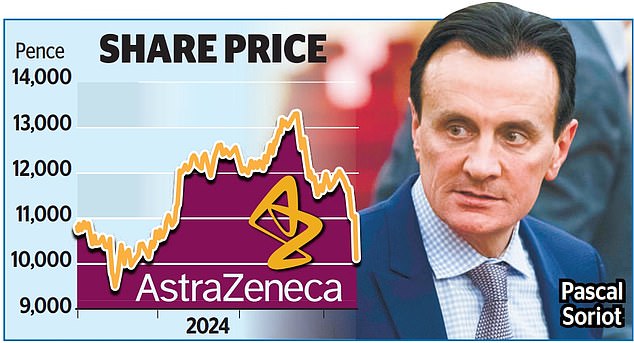Table of Contents
AstraZeneca shares suffered their worst daily decline in more than four years following reports that executives at its China business are involved in a widening fraud investigation.
The FTSE 100 pharmaceutical giant, one of the UK’s largest companies, lost £14.4bn of its value after a Chinese state-controlled media outlet said dozens of company managers were implicated in a scandal.
An announcement by the group last week revealed that the president of its Chinese arm, Leon Wang, was under investigation.
Shares hit: In a blow to boss Pascal Soriot (pictured), AstraZeneca lost £14.4bn of its value after Chinese media said dozens of managers were implicated in a scandal.
An expert at the drugmaker has alleged that expanding the targets put “extreme pressure” on AstraZeneca sales representatives and contributed to compliance issues, according to Shanghai-based Yicai.
The news outlet also reported that the investigation into AstraZeneca has expanded to include multiple government agencies.
The shares fell 8.4 per cent, or 928 pence, to 10,114 pence. That took losses from their peak in early September, shortly after becoming Britain’s first £200bn company, to 24 per cent.
The sell-off over the past two months – which coincided with a series of issues in China – has seen its value fall from £205bn to £156bn.
The investigation is a setback for CEO Pascal Soriot, who has been praised for his stewardship of the company since taking over in 2012.
The stock had more than quadrupled during his tenure, before the recent sell-off, and is still up about 250 percent.
An AstraZeneca spokesperson said: ‘As a matter of policy, we do not comment on speculative media reports, including those related to ongoing investigations in China. If requested, we will fully cooperate with the Chinese authorities.”
In October, reports emerged that Eva Yin, a former top executive at AstraZeneca’s business in China, had been detained.
The previous month, Chinese authorities also detained five current and former employees, reportedly for questioning about potentially violating data privacy laws and importing drugs without a license.
This is not the first time AstraZeneca has clashed with Chinese officials.
In 2022, local police arrested several employees as part of an investigation into whether they had falsified patients’ genetic test results to claim funds from China’s state health insurance fund.
The consequences of this latest investigation threaten AstraZeneca’s business in one of its most critical markets. China accounted for £4.5bn in sales last year, around 13 per cent of its total.
AstraZeneca is the largest pharmaceutical company operating in China and has around 17,000 employees. The group also plans to build a £350m factory and recently signed a series of licensing deals with Chinese companies.
These include a £1.5bn deal struck last year with Chinese company Eccogene to develop a weight-loss drug, as AstraZeneca tries to tap into growing demand for drugs such as Ozempic.
It is not the only British pharmaceutical company seeking deals in China.
Last week, FTSE 100 rival GSK signed a £653m deal with Chinese biotech firm Chimagen to buy an experimental drug for the autoimmune disease lupus.
DIY INVESTMENT PLATFORMS

AJ Bell

AJ Bell
Easy investing and ready-to-use portfolios

Hargreaves Lansdown

Hargreaves Lansdown
Free Fund Trading and Investment Ideas

interactive inverter

interactive inverter
Fixed fee investing from £4.99 per month

sax

sax
Get £200 back in trading fees

Trade 212

Trade 212
Free trading and no account commission
Affiliate links: If you purchase a This is Money product you may earn a commission. These offers are chosen by our editorial team as we think they are worth highlighting. This does not affect our editorial independence.


